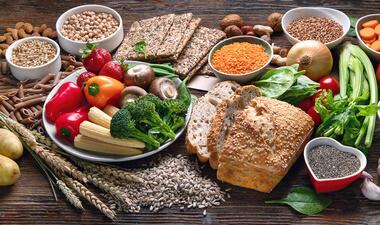
Dietary fibres have their name for a reason. Because they are not ballast, but indispensable for good health. The German Nutrition Society recommends that adults eat 30 grams of dietary fibre daily. Studies show that a lack of dietary fibre is a risk factor for obesity, diabetes, high blood pressure, heart attacks and other ailments. Dietary fibres are fibre-rich components of plant foods that reach the large intestine undigested.
The Baden-Württemberg State Centre for Nutrition at the State Institute for Agriculture, Food and Rural Areas (LEL) has found an interesting approach to an important topic. "Dietary fibres bear their name wrongly. Because they are not ballast, but indispensable for a functioning digestion," the institution writes about the importance of dietary fibres. These are largely indigestible food components, mostly carbohydrates, which are predominantly found in plant foods. They are found above all in cereals, fruit, vegetables, pulses and, in small quantities, in milk. Dietary fibres are thus an important component of the human diet.
Furthermore, the Baden-Württemberg State Centre for Nutrition explains: "Dietary fibres are fibre-rich components of plant foods that reach the large intestine undigested. They consist of long, tasteless sugar chains. There are water-soluble dietary fibres, such as inulin and pectin, which are mainly found in fruits and vegetables. Water-insoluble dietary fibres, such as cellulose and lignin, are mainly found in cereals and cereal products."
Five portions of fruit and vegetables daily on the menu
The German Nutrition Society (DGE) recommends that adults eat 30 grams of dietary fibre daily. They can easily reach this amount by including five portions of fruit and vegetables/legumes, one portion of cereal flakes, two to three slices of wholemeal bread and one portion of potatoes, wholemeal pasta or brown rice in their diet. According to the "National Consumption Study II" published by the Max Rubner Institute, cereal products are the most important source of dietary fibre for Germans (41 percent), ahead of fruit (21 percent) and vegetables (16 percent).
Studies show that a lack of dietary fibre is a risk factor for obesity, diabetes, high blood pressure, heart attacks and other ailments. Digestion suffers, haemorrhoids and constipation can be the result. Many diseases could be cured with sufficient dietary fibre or would not develop in the first place. Fibre is indispensable for gastrointestinal health and digestion.
Dietary fibre protects against colon cancer
The Landeszentrum für Ernährung Baden-Württemberg (Baden-Württemberg State Centre for Nutrition) once again states: "[Dietary fibres] ensure that food remains in the stomach for a longer period of time and thus promote the feeling of satiety. They bind water in the intestine and thus increase the volume of stool. The resulting increased stimulus on the intestinal wall stimulates intestinal movement and thus shortens the residence time of the food in the intestine. This also means that carcinogenic substances do not have long to come into contact with the intestinal mucosa. This is the reason for the protective effect of dietary fibres against colon cancer. The increased stool volume caused by water improves stool consistency and constipation occurs less frequently. The prerequisite is an adequate fluid intake. Dietary fibres bind bile acids and remove the cholesterol they contain from the body. The body has to produce new bile acids and needs cholesterol to do so, which in turn lowers cholesterol levels. Scientific studies have shown that fibre-rich meals lead to a reduction in blood sugar levels in diabetics. The reason for this is that fibre delays the absorption of carbohydrates from the intestine into the blood. Positive colon bacteria need soluble dietary fibres as food and break them down almost completely into short-chain fatty acids. These serve as an energy supplier for the colon mucosa and maintain the barrier function against harmful germs."
Too much cholesterol is unhealthy
Speaking of which: Nothing works without cholesterol, but neither does too much cholesterol. The fat-like substance is important for building cell membranes and cell walls as well as for the formation of certain hormones. However, if too much cholesterol is floating in the blood, it can affect our health. Elevated cholesterol levels - that is, too much LDL cholesterol, too little HDL cholesterol - mean a higher risk of cardiovascular disease. The blood vessels can become clogged and the supply of oxygen and nutrients to the heart and brain is impaired. If various risk factors are combined, heart attacks and strokes can result.
To lower blood lipids, it is important to eat a balanced and healthy diet. In addition to sufficient exercise and not smoking, certain foods should be avoided. These include an incorrect diet that is too rich in fats, i.e. too much saturated fatty acids and trans fatty acids, too little polyunsaturated fatty acids, too few omega-3 fatty acids and too little dietary fibre. People who have been diagnosed with high cholesterol by their doctor can make a significant contribution to normalising the cholesterol level in their blood by eating a healthy diet and changing their diet.
The onion has cholesterol-lowering properties
Fortunately, Mother Nature provides a wonderful balance with her rich and varied food supply. Certain foods, such as garlic and onions, are said to lower LDL cholesterol and raise HDL levels in the blood, among other benefits. Onions have cholesterol-lowering properties because they are rich in essential oils, sulphur-containing compounds, phytochemicals, vitamins and zinc. In addition to onions, garlic also scores with positive effects on blood lipid levels and helps prevent arteriosclerosis. The active ingredient in garlic, alliin, inhibits important enzymes in cholesterol synthesis. Wild garlic also has a positive effect on cholesterol levels.
Incidentally, a new finding regarding the importance of dietary fibres is very interesting, as reported by the "Neue Zürcher Zeitung" (NZZ). Dietary fibre could protect against the consequences of traumatisation, i.e. post-traumatic stress disorder (PTSD). In the "Canadian Longitudinal Study of Ageing", tens of thousands of people are observed over at least twenty years and various factors influencing the ageing process and health are examined.
Dietary fibres have important functions for brain metabolism
It is conceivable that people who eat a lot of fibre are less prone to PTSD for completely different reasons. For example, they could have a high level of education and therefore generally pay attention to a balanced diet rich in dietary fibre and at the same time have better access to early therapies, writes the NZZ. Perhaps the rapid treatment would then have prevented the disease, and the dietary fibre would be irrelevant in this respect.
But maybe not. According to the article, the study authors also cite arguments in favour of a causal link between dietary fibre intake and PTSD. "The key word is 'short-chain fatty acids'. These compounds are formed by bacteria in the large intestine when they break down dietary fibre. They have important functions in brain metabolism that are currently being intensively researched."
In this respect, the following applies: A diet rich in dietary fibre is harmless in any case and we are all called upon to turn more strongly to this topic again!
* This text may contain translation errors as the translation was performed by an online translation tool.










